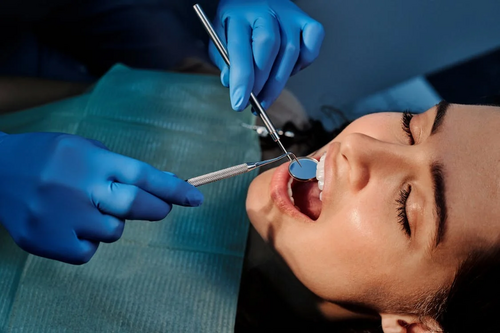
27 Oct Why You Should be Going to the Dentist to Prevent Problems
Dental care can sometimes slip to the bottom of people’s lists of things to do. This might be due to the cost, due to fear of the dentist, or due to distractions in life. Many people incorrectly believe that they can ignore dental problems until they start to cause pain or dentition issues, but this is actually the last thing that you should do.
Your dentist in Buckhead, GA can help you to prevent long-term health issues that can be avoided with proper dental care. Your tooth and gum health impacts your overall well-being and things like your nutrition. Having good oral health also ensures that you increase your risk of getting a serious infection that can damage your heart or other organs.
Why You Need to Go to the Dentist to Prevent Problems
Your oral health is key for your overall well-being. These are the reasons that you need to take your oral well-being seriously and go to the dentist on a regular basis. Getting a cleaning and check-up at least once a year is important for many reasons. Preventing oral health issues requires a complete dental care protocol that you stick to each and every year.
1. Overall Nutrition and Health
Your overall health and nutrition depends on good oral health. Without healthy teeth and gums, you might struggle with nutrition, which can lead to long-term health problems. While you might have more oral health challenges than someone else, your dentist can help you to maintain a healthy smile.
Things like cavities, broken teeth, or infected gums can also lead to serious health problems like heart issues. You will be able to avoid manyE of these issues by ensuring that you are taking care of your oral health and well-being each and every day.
Many people believe that a cavity or a small problem with their gums will remain a manageable issue until they have time and money to head to the dentist at some future date. In reality, your oral health can cause a domino effect that could impact your well-being in a big way.
2. Prevents Pain
Many oral health issues start out as small problems that are not that distracting. However, over time, these issues can become more significant and painful. Dental-related pain can be really intense due to the large number of nerves in and around your mouth. Even your teeth have nerves, which is why even a small amount of dental decay or something like a cracked tooth can be so painful.
If you don’t want to struggle with long-term oral pain and discomfort, you need to make sure that you are going to the dentist on a regular basis. Getting your annual cleaning and talking to your dentist about oral health concerns can go a long way toward preventing painful teeth and gums.
3. Avoid Major Surgery
There are many dental health issues that can be resolved quite readily if you catch them early. Things like cavities and small problems such as gum infections, can be taken care of quite easily in most cases. When you neglect oral health issues, they can become far more serious, which can lead to costly and painful dental procedures that could have been avoided if you were getting the proper dental care.
Oral surgery can be a multi-step process as well since many of these surgeries will require bone grafts and other preparation before implants and other dental solutions can be placed where teeth used to be. Avoiding major oral surgery should always be at the top of the list of reasons that you should be going to the dentist on a regular basis.
4. Identify Issues Early
Many people believe that they will “just know” that there is something wrong with their teeth. However, there are many oral health challenges that are actually really hard to identify just based on whether or not you are in pain.
Your dentist has the experience and skill set to notice problems with your teeth before they become significant issues. Things like oral X-rays and other preventative care procedures can reveal issues with your oral health before they become painful or require interventions like surgery.
Always remember that you should not have to wait until something is painful to find out if there is an issue with your oral well-being. If you have noticed anything that just doesn’t seem right, you should call your dentist and be seen right away. The sooner that problems are identified, the better your long-term prognosis for your oral health.
5. Discuss Issues and Concerns
When you visit your dentist on a regular basis, you will be able to talk with them about concerns and questions that you have before they slip your mind. Everything from what kind of toothpaste to buy to questions about things you have noticed over the past few months can be handled at your annual visit with your dentist.
Having an open line of communication with your dentist is important. For most people, being comfortable enough to talk to their dentist about these topics means that they will be that much more likely to reach out if they have a dental health concern that has cropped up.
Good Oral Health Requires Visits to the Dentist
While brushing and flossing are important for your oral health, you still need to visit the dentist on an annual basis to maintain healthy teeth and gums. Your dentist can recommend improved oral healthcare options for your benefit, spot issues with your teeth before they become major health concerns, and suggest ways to keep your teeth and gums as healthy as possible for years to come.
Good oral health requires that you have established a routine care protocol, but also that you have a skilled dental team on your side.
For more information:
- https://www.cdc.gov/oral-health/prevention/oral-health-tips-for-adults.html
- https://www.webmd.com/oral-health/ss/slideshow-tooth-problems
—————————-
The information on MedicalResearch.com is provided for educational purposes only, and is in no way intended to diagnose, cure, or treat any medical or other condition.
Some links are sponsored. Products, included compounded prescriptions above, are not warranted or endorsed.
Always seek the advice of your physician or other qualified health and ask your doctor any questions you may have regarding a medical condition. In addition to all other limitations and disclaimers in this agreement, service provider and its third party providers disclaim any liability or loss in connection with the content provided on this website.
Last Updated on October 27, 2024 by Marie Benz MD FAAD


